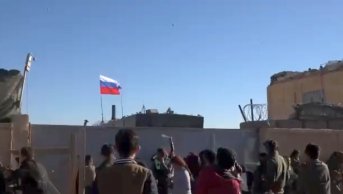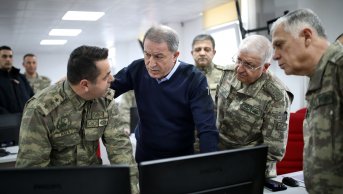Post-Raqqa Phase in Syria

The capture of Raqqa by US-YPG alliance marks a new period in Syria. Following this development, DAESH does not have remarkable presence left in Syria, except some border towns and the border crossing in Abu Kamal. The end of DAESH control in Syria is only a question of time now. US Syria policy has been largely limited to the fight against DAESH since 2014. US Secretary of Defense has also become the decision maker and practitioner of Syria policy. The USA will have to tackle the damages caused by the policies carried out only having regard to military concerns in post-DAESH period in Syrian territory and in external allies of the USA and to decide whether it will maintain its alliance with YPG in a situation where DAESH threat necessitating such alliance has been eliminated.
The USA gives the sign that it will turn its attention to limiting Iranian influence in the region in post-DAESH period. Indeed, Iran has partly reached a decision-making position, beyond being influential in both Iraq and Syria. Iran secures such influence through al-Hashd al-Shaabi in Iraq and the militia it leads from various parts of the world, especially from Lebanon and Iraq, to Syrian territory. We may witness in the new period that the USA will put pressure on and use force against these components.
Factors such as history, geography, economics and military capacity show that Turkey is the only actor which can balance Iran in the region. However, Turkey-US relations go through one of the worst times in the history for some reasons, notably due to US support to YPG. Trump has given the first sign concerning how the USA will handle its relations with YPG after Raqqa. In his statement on Raqqa, US President has mentioned about the beginning of a new period which envisages support to local forces in Syria and reduction of the risks of conflict as well as securing a lasting peace. Therefore, the USA is likely to contact and support the Provincial Councils formed in the regions under YPG control and to establish a new political, military and civil structure in these regions in the new period. However, Turkey perceives that the Provincial Councils formed by YPG/PKK are not legitimate at all. Highlighting such provincial councils also contradicts the main logic of the Astana process based on the integrity and unity of Syria and is considered as a step taken to trigger federalism in Syria. Therefore, it is understood that tackling YPG problem between the USA and Turkey will be difficult in the new period. Under these circumstances, it becomes more important to question what kind of alliance the USA will form in the region in order to balance Iran.
In the process of liberating Raqqa from DAESH, almost 80% of the city has been destroyed as a consequence of US airstrikes. Russian Ministry of Defense has called the bombardings in Raqqa “barbarous” and has compared the airstrikes to the destruction caused by the allied forces in Dresden during the World War II. Therefore, the USA will have to focus on the reconstruction of Raqqa. It is understood that the USA wants to drive Saudi Arabia forward in this process. Special Presidential Envoy for the Global Coalition to Counter ISIS at the US Department of State, Bret McGurk visited the city together with Saudi Minister of State for Gulf Affairs Thamer al-Sabhan shortly after the capture of Raqqa. The USA wants to benefit from the financial power of Saudi Arabia in the reconstruction of Raqqa. The USA also wants Saudi Arabia to take part in the process in the regions such as Raqqa and Deir ez-Zor where Arab identity is dominant and tribalism is strongly felt, in order to minimize the lack of legitimacy that YPG will suffer. In the great scheme, the USA wants to strengthen its alliance with Saudi Arabia in these regions within the scope of its policy to balance Iran. The USA might also want to use YPG against Iran-backed Shiite militia within the framework of this political choice which has almost no chance for success.
The photographs circulating in the international media after the liberation of Raqqa from DAESH are likely to disturb two major regional powers. The photograph of PKK/YPG members with an Öcalan poster behind them at the center of Raqqa will shape Turkey’s Raqqa perception in the new period. The photograph of McGurk and Saudi Minister meeting the local components in the city will also provoke the perception of Iranian threat to Raqqa. This situation will inevitably lead to future cooperation or at least coordination between Turkey and Iran as there was in Iraq. Therefore, what makes US policy to balance Iran contradictory is that the USA takes steps leading the only power that has the capacity to balance Iran to further cooperate with Iran. For this very reason, it is less likely that the USA can balance Iran in Syria with its current alliance system.
On the other hand, PKK/YPG possibly follows with deep concern the US position in the developments taking place after the independence referendum in Iraq. It knows that it can no longer be a useful means or it will at least lose its previous importance in a situation where the fight against DAESH has ended. YPG/PKK has so far needed the USA in order to reach its present geography and to form its “army”. However, it will now aim at preserving its gains, consolidating its power and ensuring that its de facto situation can gain constitutional grounds. It has two chances in order to achieve this. First, the USA may maintain its support and secure the immunity of the regions under YPG control. Secondly, it may make a deal with Russia/Iran and the regime. The first option may be preferred since YPG can maintain its position without making so many sacrifices. However, it might be used in this case as a local partner against Iran-backed militia and PKK is aware of the heavy costs of this for itself. Furthermore, it is less likely that the USA will have large-scale military engagements in the region. In such a situation, it will not be surprising if YPG/PKK shifts towards Russia's axis in post-Raqqa period.
It is known that Russia’s contributions are vital for the Syrian regime to survive and gain strength. There is still strong alliance between the parties. However, the difference of views between two actors regarding the future of Syria will increasingly come forth in the period after Raqqa and Deir ez-Zor, in a situation where the power distribution is more or less shaped in the civil war. As for Russia, the best option is to make a political deal having regard to the current borders, after the Iraqi border is also taken under control. According to Russia, the regime will control most of the territory as the strongest actor in Syria, the country will have a federal structure, the regime and YPG will make a deal and a political solution will be reached between moderate opposition groups and the regime. Syrian regime and Iran, which possibly acts in parallel with the regime, do not believe much in the radical-moderate division among the opposition groups. They know that the opposition groups cannot force the regime to make significant political sacrifices through small parts under their control. The regime considers that it can force the armed groups in these small parts to lay down arms by taking inconsiderable initiatives and that it can eliminate them otherwise. Similarly, federalism is also a red line for the regime. The ground for a tactical cooperation with YPG has disappeared and the regions under YPG control which include US bases and are located on Syrian natural resources have started to cause troubles for the regime. After YPG has taken control of Raqqa, Syrian officials’ statements indicating that “Raqqa is considered as occupied as it was before as long as it is not under the control of Syrian army” should be taken into consideration within this framework. In the current situation, almost 25% of Syrian territory and 60% of its natural resources are under Syrian control. It is clearly seen that this is unacceptable and unsustainable for the regime and Iran. Therefore, it is highly likely that post-Raqqa phase will create the dynamics of a new conflict between the regime and YPG in Syria. On the other hand, Russia will make efforts to prevent this and will want to pave a ground which can be accepted by both sides. This ground can be paved if YPG accepts to withdraw from some regions or to share natural resources. However, it can be said that there is a yawning gap between the demands of the regime and the sacrifices YPG may make and that the ground for a deal is unreliable.
It seems possible that Russia and the USA will focus on a political solution through the current balances in Syria in the new period. The USA may want to put the Geneva process forward within this framework. Russia, on its part, makes efforts to take new initiatives in terms of a political solution, through “Syrian Peoples’ Congress” to be held in Sochi in mid-November 2017. Despite this, we can say that Turkey, Iran and the regime are not satisfied with the current map in Syria. Russia’s focus on a political solution, Syrian Peoples’ Congress and the invitation sent by Russia to PYD for this event put Astana process under risk. Russia’s insistance in protecting YPG in Afrin despite Turkey’s expectations also causes problems. However, Turkish and Russian leaders will come together for the second time within the last few months. As a consequence of these negotiations, some developments may take place to relieve both sides in terms of Idlib and Afrin. Otherwise, Astana process might be suspended.
It seems that Turkey faces several difficulties that it should overcome with regard to these complicated balances. Turkey is aware of Russia’s intentions about federalism in YPG and Syria despite its cooperation with Russia in Syria. Russia, on its part, wants Turkey to fight al-Nusra Front in Idlib while Turkey refuses to accept it before any progress is made for Afrin. On the other hand, Russia also leaves an open door to Israel in order to balance Iran in Syria. Russian Minister of Defense Sergey Shoygu paid a visit to Israel in mid-October. Following this visit, Israeli officials shared the message that they would not allow Hezbollah and Iran to gain strength in Syria. Therefore, Iran is aware of Russia’s intention to balance itself in Syria and knows that Russia is not an actor which it can rely on until the end. This leads Turkey and Iran to have increasingly similar perspectives in Syria in the following period. This situation does not necessarily mean that Turkey will stop supporting Syrian opposition groups. All actors try to prepare the strongest moves in a situation where the next step cannot be foreseen in Syria. Accordingly, Turkey continues its efforts to help the recovery of the Euphrates Shield region, to set up a successful system and to unite the armed opposition groups. Similarly, it also continues supporting Idlib and the FSA groups in this city. One of the biggest difficulties that Turkey will face in the following period is to cope with the conflicts between its own security concerns and the expectations of Syrian opposition groups.











